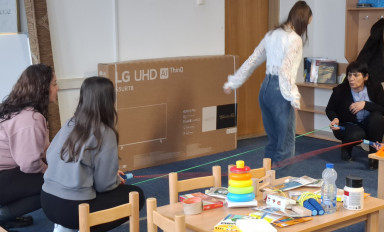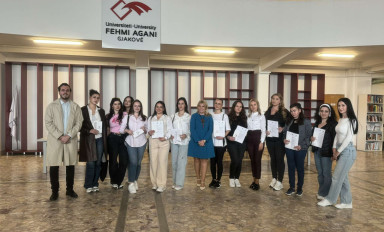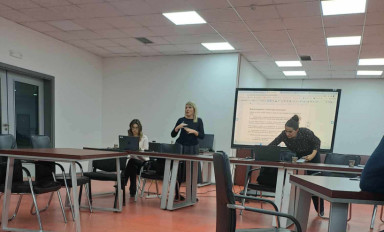Mathematics Education
The Master's Program in Mathematics Education is a study program that offers opportunities for career development, professional advancement, and conducting research in the field of mathematics. Through deepening knowledge of innovative learning theories, as well as applying proven successful methodologies and pedagogical practices during the teaching and learning process of mathematics, this program aims to prepare educators with high professional standards, ready to meet the demands of the job market for qualified mathematics teachers.
The professional and continuous development of mathematics teachers is a fundamental process for lower and upper secondary schools, which are interested in recruiting teachers specialized in adapting mathematics teaching to the needs and interests of students, as well as creating motivating environments that support the development of their potential in this subject. The low performance of students in mathematics, as reflected in international assessment programs such as TIMSS and PISA, has increased the need for lower and upper secondary schools to have high-quality mathematics teachers, who should be knowledgeable about the latest developments in the science of mathematics education, as well as effective teaching models and platforms that enable students to achieve the highest possible outcomes in this subject.
According to Administrative Instruction No. 05/2021, mathematics teachers in lower and upper secondary schools must have at least 300 ECTS credits to practice their profession in schools. Since undergraduate (Bachelor's) programs in mathematics are 4-year programs with 240 ECTS credits, there is a need for both in-service teachers and students graduating from undergraduate programs to pursue at least one additional year of master's studies. The Master's Program in Mathematics Education is a one-year study program designed to provide in-service teachers with professional sustainability and to enable students who have completed undergraduate studies and wish to become mathematics teachers to obtain the necessary qualifications for this profession.
Overall, the Master's Program in Mathematics Education represents an investment in the continuous professional development of teachers, aiming to prepare them as lifelong learners. Additionally, the program seeks to contribute to enhancing the quality of education by preparing a new generation of teachers capable of leading and advancing teaching practices at an advanced level, including the effective use of technology, digital platforms, and methodological innovations in the field of education.
The Master's Program in Mathematics Education prepares students to:
- Understand innovative theories of learning and curriculum development, as well as pedagogical methodologies and practices proven effective in the teaching and learning of mathematics;
- Organize teaching based on the three main pillars of effective mathematics education:
fostering students’ cognitive development, supporting their full potential in mathematics, and managing classrooms effectively;
- Apply theoretical knowledge and research-based new methods for teaching algebra and geometry, enabling students to achieve learning outcomes and develop competencies;
- Utilize contemporary teaching and learning methodologies that establish a longitudinal and sustainable connection between learning mathematical concepts, following a developmental spiral that starts with concrete concepts and advances to more complex and abstract notions;
- Implement diverse teaching and learning strategies and techniques that encourage creativity, critical thinking, and problem-solving;
- Analyze the connections between different mathematical fields and apply knowledge to solve real-world problems;
- Integrate multimedia tools and digital games into the teaching process to facilitate students' understanding of mathematical concepts and procedures;
- Conduct differentiated teaching in classrooms, allowing talented students to excel in mathematics and supporting those who face learning difficulties;
- Plan objective assessments of students by employing various types and instruments of formative and summative evaluation;
- Carry out research projects on the teaching and learning of mathematics based on different research methodologies;
- Develop skills for continuous professional growth and lifelong learning.

 Library
Library 


.png)
